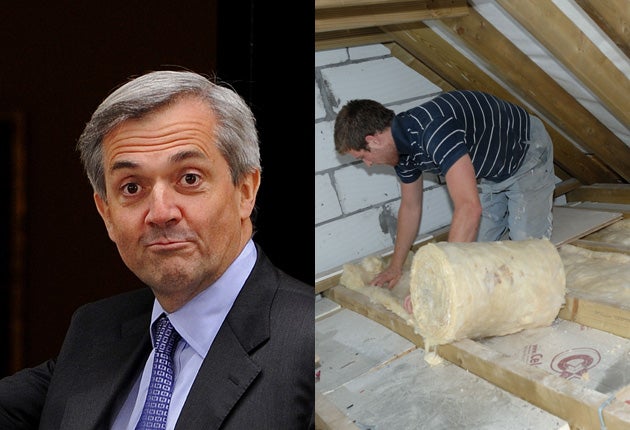Huhne's plan 'charter for cowboy builders'

Your support helps us to tell the story
From reproductive rights to climate change to Big Tech, The Independent is on the ground when the story is developing. Whether it's investigating the financials of Elon Musk's pro-Trump PAC or producing our latest documentary, 'The A Word', which shines a light on the American women fighting for reproductive rights, we know how important it is to parse out the facts from the messaging.
At such a critical moment in US history, we need reporters on the ground. Your donation allows us to keep sending journalists to speak to both sides of the story.
The Independent is trusted by Americans across the entire political spectrum. And unlike many other quality news outlets, we choose not to lock Americans out of our reporting and analysis with paywalls. We believe quality journalism should be available to everyone, paid for by those who can afford it.
Your support makes all the difference.A plan to allow millions of people to insulate their homes using savings from future energy bills will today be endorsed by ministers – despite fears the scheme could become a "cowboy builders' charter".
Under the proposals to be outlined by the Energy and Climate Change Secretary, Chris Huhne, households will pay nothing upfront for insulation work, with the cost being covered by savings made in lower heating bills. A similar scheme in Australia was scrapped earlier this year after it was revealed that 160,000 homes had been fitted with sub-standard insulation, 80,000 households faced safety risks from the work and four installers died while carrying out the work. Last night Mr Huhne's advisors played down concerns that the British scheme could be beset by similar problems.
It is estimated there are up to 14 million homes in Britain that could benefit from measures like loft, cavity and solid wall insulation. Under the scheme, called the Green Deal – which will start in two years' time – all households will be able to apply for a free survey of their property and get advice on the energy efficiency options.Finance for any work would then be provided by Government-accredited providers and be repaid over time from the savings on energy bills.
The plan is to extend the Green Deal to businesses, as well.
Last night the Department for Energy and Climate Change (DECC) confirmed that companies accredited to carry out energy surveys would also be able to carry out the work, leading to fears of miss-selling. The department was unable to say how it would ensure tradesmen would be qualified.
"What happened in Australia is at the front and back of our minds," said a spokesman. "We will ensure there are very robust standards of accreditation in place."
Among the first sectors of the housing market to be targeted will be the rental sector where 650,000 houses have the two worst energy efficiency ratings. Both landlords and tenants will be encouraged to apply to take part in the scheme with landlords unable to refuse a request by their tenants to have the work done. If voluntary take-up is not high enough, landlords may be banned from renting their properties until the improvements are made.
DECC said that up to 100,000 jobs could be created by 2015 and that everyone would be trained to a recognised and tested standard. A spokeswoman for Which? said: "It is absolutely vital consumers are protected but there is little detail on how the Green Deal will work. We are pushing ministers to make sure there is independent monitoring and enforcement and consumers are clear what they are entering into."
The Australian experience
In February, Australia scrapped its botched $2.45bn (£1.5bn) insulation scheme after the Government admitted that 160,000 homes had been fitted with sub-standard insulation of little benefit to the environment.
Environment Minister Peter Garrett blamed "unscrupulous, sometimes illegal and shonky operators" for problems linked to four deaths and 87 house fires. Mitchell Sweeney, 22, was among those killed, when his staple gun pierced a live electric cable.
Before the scheme ended, 1.1 million homes were insulated, as part of a stimulus package aimed at creating jobs for tradesmen and unskilled workers. But instead, about 6000 workers attracted to the sector lost their jobs.
A report by Australia's auditor-general found that the programme – which began in February 2009 – became overwhelmed with the number of claims relating to safety, due to incorrect installation and alleged fraud.
Join our commenting forum
Join thought-provoking conversations, follow other Independent readers and see their replies
Comments